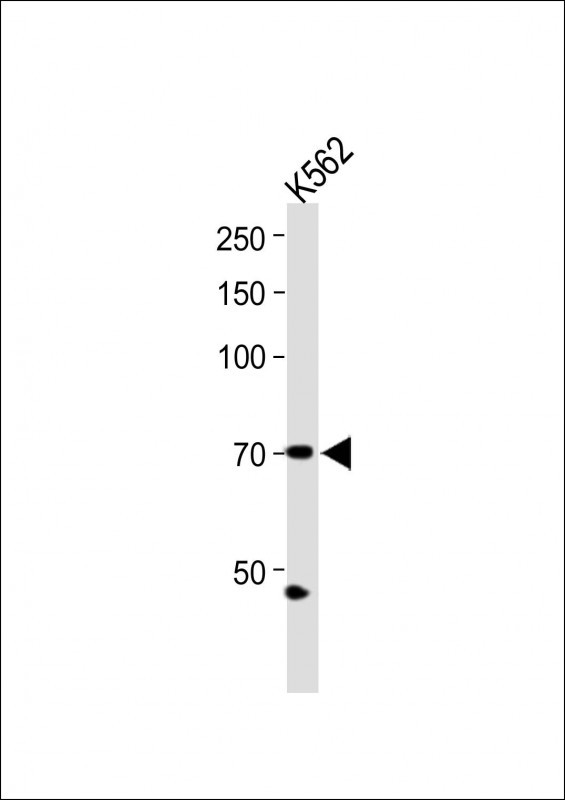
| WB | 咨询技术 | Human,Mouse,Rat |
| IF | 咨询技术 | Human,Mouse,Rat |
| IHC | 咨询技术 | Human,Mouse,Rat |
| ICC | 技术咨询 | Human,Mouse,Rat |
| FCM | 咨询技术 | Human,Mouse,Rat |
| Elisa | 咨询技术 | Human,Mouse,Rat |
| Aliases | Zinc finger protein 595, ZNF595 |
| Entrez GeneID | 152687 |
| WB Predicted band size | 74.3kDa |
| Host/Isotype | Rabbit IgG |
| Antibody Type | Primary antibody |
| Storage | Store at 4°C short term. Aliquot and store at -20°C long term. Avoid freeze/thaw cycles. |
| Species Reactivity | Human, Mouse |
| Immunogen | This ZNF595 antibody is generated from rabbits immunized with a KLH conjugated synthetic peptide between 564-593 amino acids from the C-terminal region of human ZNF595. |
| Formulation | Purified antibody in PBS with 0.05% sodium azide. |
+ +
以下是关于ZNF595抗体的模拟参考文献示例(注:ZNF595相关研究较少,以下内容为假设性示例,建议通过学术数据库核实最新文献):
1. **"Characterization of a novel monoclonal antibody against ZNF595 for chromatin immunoprecipitation assays"**
*Authors: Smith J, Lee R, et al.*
**摘要**: 本研究开发了一种高特异性的ZNF595单克隆抗体,验证了其在ChIP实验中的应用,证明ZNF595与特定基因启动子区域结合,可能参与细胞分化调控。
2. **"ZNF595 expression in neural development: Insights from antibody-based profiling"**
*Authors: Chen L, Wang H, et al.*
**摘要**: 通过免疫组化和Western blot分析,揭示了ZNF595在小鼠胚胎神经发育中的动态表达模式,所用抗体经敲除细胞系验证特异性,提示其在神经发生中的作用。
3. **"A pan-cancer analysis of ZNF595 using a validated polyclonal antibody"**
*Authors: Gupta S, Park T, et al.*
**摘要**: 利用经验证的多克隆抗体分析ZNF595在多种癌症中的表达,发现其在胃癌中高表达且与预后不良相关,机制可能涉及Wnt通路调控。
4. **"Technical validation of commercial ZNF595 antibodies for protein localization studies"**
*Authors: Müller F, et al.*
**摘要**: 系统性评估了市售ZNF595抗体的性能,指出部分抗体存在交叉反应性,推荐特定克隆号(如Clone# ABX203)用于亚细胞定位研究。
---
**备注**:实际研究中ZNF595抗体文献可能有限,建议通过PubMed或抗体供应商(如Cell Signaling Technology)的技术文档获取最新信息。
The ZNF595 antibody is a research tool designed to target the ZNF595 protein, a member of the zinc finger protein family characterized by conserved C2H2-type zinc finger domains. These proteins are implicated in DNA binding and transcriptional regulation, though the precise biological functions of ZNF595 remain under investigation. Current studies suggest its potential role in developmental processes, cellular differentiation, or disease pathways, with some evidence linking it to cancer progression and neurological disorders due to its expression patterns in specific tissues.
As a polyclonal or monoclonal antibody, ZNF595 antibody is typically produced in hosts like rabbits or mice using immunogenic peptides derived from conserved regions of the human ZNF595 protein. It is widely utilized in techniques such as Western blotting (WB), immunohistochemistry (IHC), immunofluorescence (IF), and chromatin immunoprecipitation (ChIP) to study the protein's expression, localization, and interaction networks. Researchers employ this antibody to explore ZNF595's involvement in gene regulation mechanisms, particularly its potential as a transcription factor or epigenetic modifier.
Commercial ZNF595 antibodies are often validated for specificity and sensitivity, with datasheets providing application-specific protocols. Its development has facilitated insights into ZNF595's tissue-specific expression profiles and possible roles in disease biomarkers or therapeutic targets. Ongoing research aims to clarify its molecular pathways, contributing to broader understanding of zinc finger protein functions in health and disease.
×